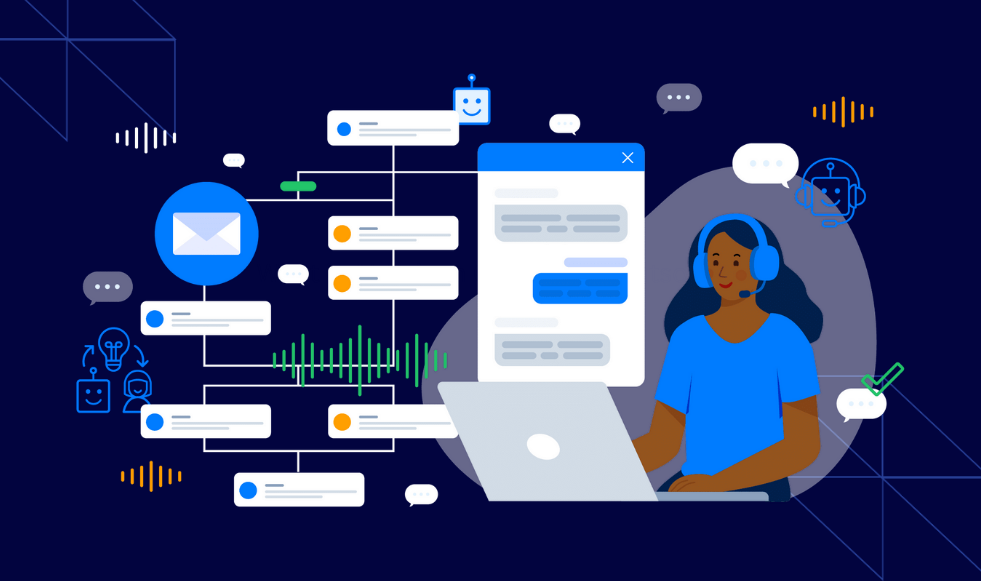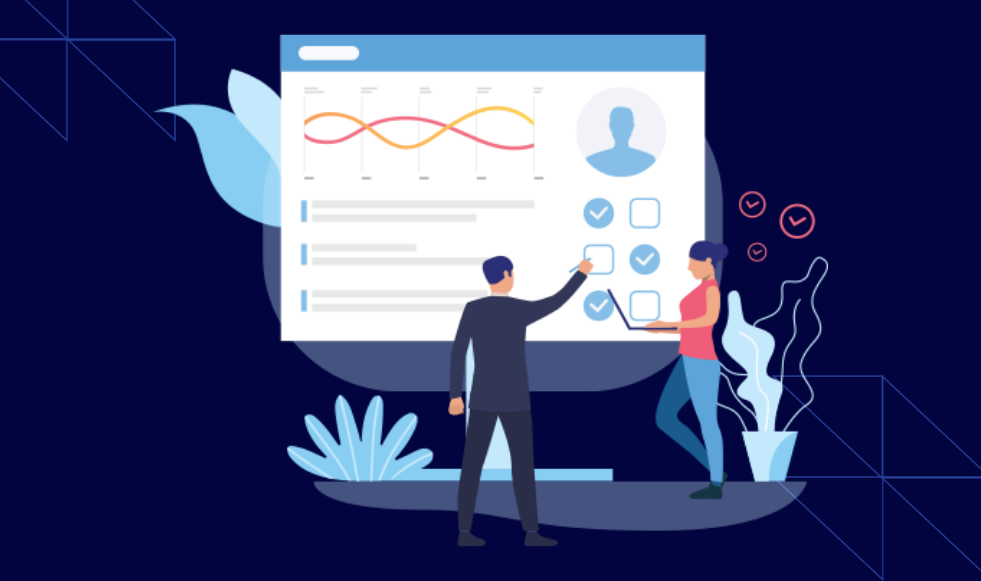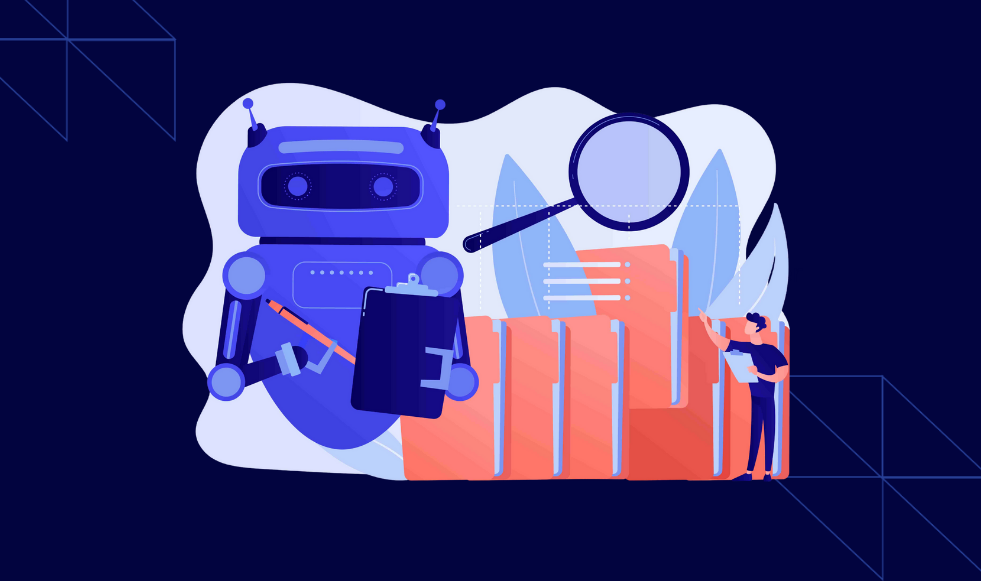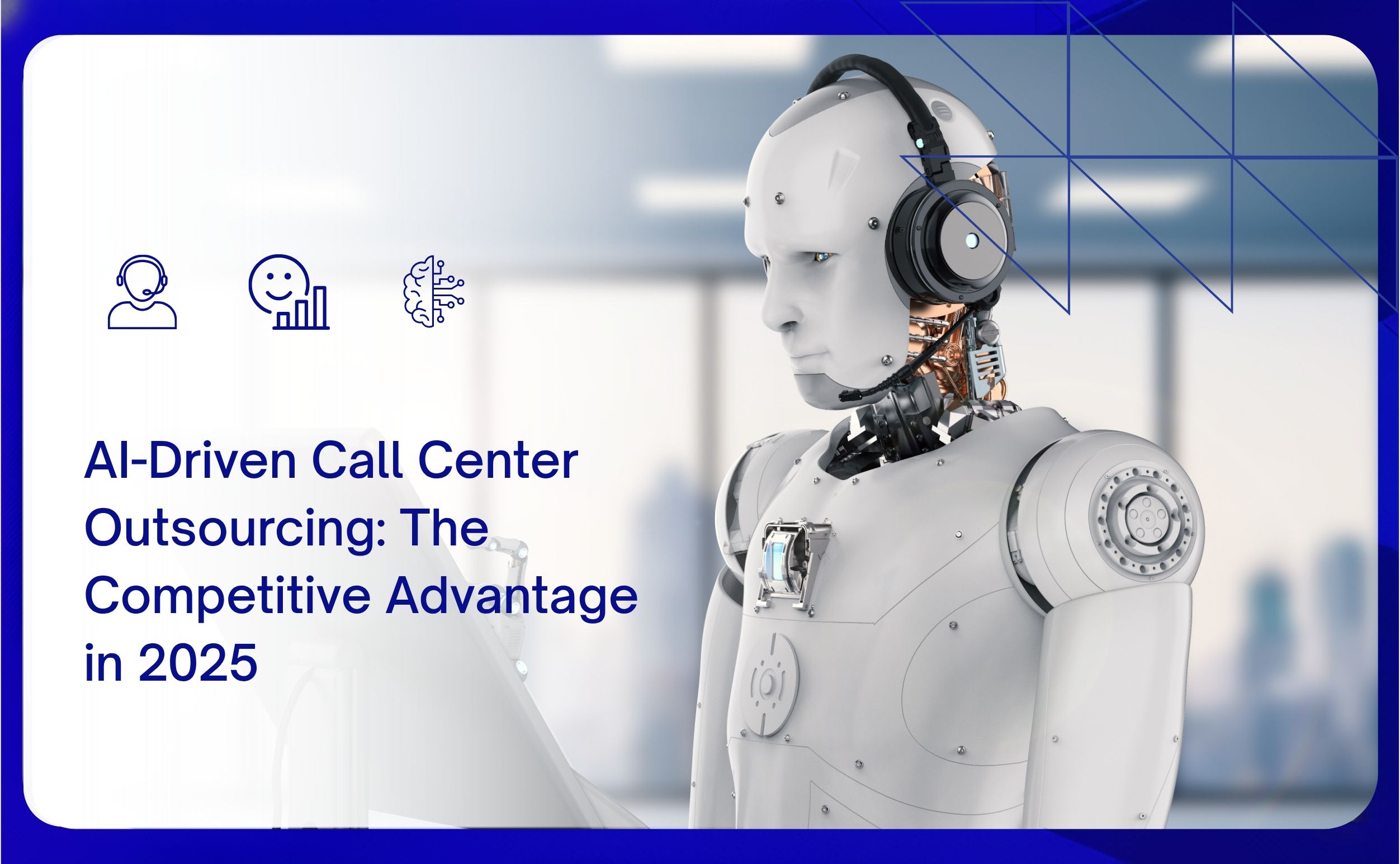Table of contents
- Introduction
- What is AI-Driven Call Centre Outsourcing?
- What are the Core technologies used in the Call centre Automation?
1. Automatic Call distribution and Call routing
2. Interactive Voice Response
3. Real-time Call monitoring
4. Computer telephone integration
- What are the emerging trends in the Call center Automation?
1. Robotic Process Automation
2. Predictive Call Routing
3. Intelligent IVR systems
4. Conversational AI chatbots
5. AI predictive Auto dialing
6. AI speech analytics
7. Sentiment Analysis
8. Predictive Analytics
9. Generative AI Agent Assist
- What are the competitive advantages of the AI-Driven Call Center Outsourcing in 2025?
- Final Thoughts
- Frequently Asked Questions
Introduction
Today, we are living in the world of revolution. With the advancement of technologies and the impact of AI, most businesses are transitioning away from the conventional methods they previously used. Artificial intelligence has revamped the way business operates. The call center services are also no exception. The integration of AI in the call center industry has enabled businesses to elevate their operations to higher levels. Be it improving customer satisfaction, efficiency, or the overall user experience, AI has made a huge impact.
In 2025, we are more into the AI call centre. Through this blog, we will give you a clear insight into the AI-driven call centre outsourcing and the competitive advantages of the AI call centre in 2025.
What is AI-Driven Call Centre Outsourcing?

AI-driven call centre outsourcing refers to the use of Artificial Intelligence to enhance outsourcing services in call centres. The conventional outsourcing relies only on the human agents, whereas the AI-driven call centre outsourcing will skillfully integrate the latest technology with the human expertise to deliver more productive, scalable, faster, and accurate solutions. Recent studies have shown that the operational efficiency with AI in call centres has risen by 30%.
Let us take a deeper look at the AI call centre
The AI-powered call centre perfectly integrates advanced technologies like Natural Language Processing(NLP). Automatic speech recognition, machine learning to optimize the routine tasks, analyze conversations to get real-time insights, and provide instant and personalized responses. The conventional call centres rely completely on the human agents to manage every interaction manually. While the AI-powered call centers use advanced technologies to handle the basic inquiries and assist the customers with all the needful. With the call center automation, the productivity is increased and thus leading to enhanced customer satisfaction.
What are the Core technologies used in the Call centre Automation?

There are so many core technologies used in call center automation. Building the right call center automation depends on the right usage of the technologies. Here is the list of core call center technologies widely used in call centers.
-
Automatic Call distribution and Call routing
One of the most important technologies used in the call centre is the Automatic Call Distribution or ACD. This technology works well with inbound calls. The calls are processed and distributed among the available agents, ensuring that the calls from the customers are routed to the appropriate department dealing with the queries. Not only that, with ACD, the work is equally balanced, thus enhancing productivity.
The call routing can be done in two ways. One based on the time and the other based on the skill. The time-based call routing distributes calls based on the agent’s availability. Through the skill-based routing, the calls are distributed to the agents who are experts in certain areas, have prior knowledge of the products. This reduces the average handle time, thereby improving the first-call resolution rates.
-
Interactive Voice Response
IVR or Interactive Voice Response is one of the critical technologies used in call centers. Interactive Voice Response (IVR) systems engage with callers via pre-recorded voice prompts and menu options, guiding them through a sequence of selections to obtain the required information or connect with the appropriate department or agent. This automation removes the necessity for call center representatives to manually route or transfer calls, thereby conserving time and effort, minimizing human errors, and enhancing the efficiency of the entire inbound call management process.
-
Real-time Call monitoring
Real-time call monitoring is a common technology used in call centres. This technology enables managers or supervisors to listen to the ongoing calls between the customers and agents in real time. Another interesting part is that the manager can join the live chat and speak to the agents without interrupting the customer. Through this technology, the managers or supervisors can understand how the agent is dealing the customer queries, how the entire team works, and so on.
-
Computer telephone integration
The Computer Telephone integration is one of the most important and common technologies used in call centres. Through this technology, the call centre solutions are perfectly integrated with the CRM systems. This can bring a lot many benefits, including making things easier for the entire call center team. With the computer telephone integration, the agents can gather all the useful information of the customer regarding the history of the previous interactions. These data automatically pop up on the CRM screens while interacting with the customer. Through this, the agents can give a more personalized solution to the customer queries without wasting much of their time.
What are the emerging trends in the Call center Automation?

We have witnessed several advancements in call centre technologies. The implementation of the call centre automation driven by AI is rapidly increasing, impacting the future of the call centre industry. Recent studies have shown that the global call centre AI market size is expected to reach USD 7.08 billion by 2030, expanding at a CAGR of 22.7% from 2022 to 2030. In the forthcoming years, many industries will switch to AI and automation in call centres for smooth functioning. Here are the top emerging call centre trends in 2025 that will shape the future of call centres.
-
Robotic Process Automation
Robotic Process Automation uses software bots to automate repetitive tasks and operational tasks of the organization. Through this, it streamlines the workflows, avoiding the need for manual intervention.
The Operational efficiency with AI is a major advantage. The agent productivity is also improved by automating tasks and processes. Research has shown that with RPA and AI, the time spent on a particular task can be greatly reduced by 40%.
-
Predictive Call Routing
Predictive routing, referred to as call routing in the industry, is a system for contact centers that figures out which customer service agent would be the best match for each caller. The software looks at past customer behavior, persona types, or product preferences, and other factors to determine the agent skills or personality an agent should have, ensuring that the agent and the customer are well matched. On average, predictive call routing can lower call times by 14%.
-
Intelligent IVR systems
The next generation of IVR systems is the enhanced version of the traditional IVR and brings in more human-like interaction. Through this, customer satisfaction is improved. IVR systems can improve CSAT scores by 5 times. By using a smart IVR system, businesses can employ innovative technologies, such as conversational AI, natural language processing, and predictive analysis, to improve the customer experience. An intelligent IVR can understand and process natural language so that customers can comfortably communicate with the system in their own words.
-
Conversational AI chatbots
The conversational AI chatbots are virtual assistants that use AI technologies to stimulate human-like conversations to interact with customers. In call centres, it’s used to automate responses, handle routine inquiries, and provide 24/7 support, improving efficiency and customer satisfaction. By 2027, conversational AI chatbots will become the primary customer service channels for call centres.
-
AI predictive Auto dialing
AI predictive auto dialers are advanced AI technologies that use advanced software systems employing artificial intelligence and machine learning are designed to enhance outbound call campaigns by forecasting agent availability and autonomously dialing multiple numbers at once. This technology connects agents solely to live conversations, thereby maximizing productivity and minimizing idle time. With the AI predictive auto dialing, the agent’s talk time can be increased by 300%.
-
AI speech analytics
AI speech recognition, integrated with Automatic speech recognition, converts spoken words into text, enabling real-time transcription and analysis of customer calls. Using this technology in outsourced customer support, you can enhance the customer experience and customer satisfaction scores by 10%. Other than these, the AI speech analytics are cost-saving when compared to the conventional methods.
-
Sentiment Analysis
Through the sentiment analysis, the agents can understand the emotions of the customer and assist them by providing more personalized support. AI sentiment analysis is considered to be one of the fastest-growing emerging trends in the call center industry. Sentiment analysis tools enable contact centers to evaluate customer emotions during both voice and digital interactions comprehensively. These tools specifically utilize natural language processing, machine learning, speech recognition, text analytics, sentiment scoring algorithms, and other advanced technologies to precisely detect emotional cues in text or speech and classify customer sentiment as positive, neutral, or negative.
-
Predictive Analytics
Predictive analytics uses historical data to forecast trends, call volumes, and customer behaviors, enabling proactive resource allocation and issue resolution. Through predictive analytics, you can identify correlations in customer interactions, agent performance, and operational metrics to identify future performance.
-
Generative AI Agent Assist
The Generative AI agent assists in transforming the call centres at a fast pace by helping the agents serve the customer at a faster rate. But not only do AI agent assist tools allow agents to resolve customer issues faster, reducing frustrating wait times for customers and increasing customer satisfaction.
What are the competitive advantages of the AI-Driven Call Center Outsourcing in 2025?

The implementation of AI in call centers has so many advantages. Take a look at the competitive advantages of call center automation in 2025.
- Improved Operational Efficiency: Operational efficiency with AI for the outsourced customer support is enhanced. With AI, repetitive tasks can be automated. With the automation of the time-consuming tasks, it is easily handled, thus helping the agents invest their quality time in other complex tasks. Consistent processes help minimise errors and speed up average handling times.
- Reduced operational Cost: The ultimate goal of any call centre is to reduce the operational cost. One of the key benefits of AI automation in the call center is the reduction of costs. By outsourcing the call center automation, you can reduce the dependency on human agents.
- Elevated Customer Experience and overall customer satisfaction: With the automation of AI, you can provide fast responses to customer queries. Unlike conventional methods, where the agents can give customer support for a limited time, you will be able to provide 24/7 support to the customers with the AI agents. By leveraging the customer data, AI chatbots will be able to provide personalized support.
- Improving accuracy and reducing human errors: AI minimizes the risk of human error through the automation of repetitive tasks. The AI can handle voluminous data, scanning and analyzing thousands of data points at a time with accuracy. This accuracy and consistency cannot be achieved by human intelligence.
- Smart decision-making: AI collects and analyzes call data. It finds patterns and reports issues early. Managers can make better choices based on this data. Instead of guesswork, the AI works with facts. Through this, you can improve the quality of the call.
Final Thoughts,
As we approach 2026, AI in call centers is set to revolutionize the way businesses provide exceptional customer experiences. By merging the capabilities of artificial intelligence with the expertise of human agents, organizations can deliver quicker, more tailored, and more efficient customer service. The future of call centers is rooted in this harmonious integration, and early adopters of these solutions will secure a significant competitive edge.
Whether you are a start-up or a global company, with outsourced customer support, you can cater to 24/7 customer service and thus enhance the customer experience. Atidiv is your trusted partner for outsourcing customer support.
Frequently Asked Questions on AI Call Centres
-
How will AI affect call centers?
The impact of AI on call centers is substantial, as it allows for the evaluation and monitoring of all customer interactions. Core technologies such as IVR, call routing, AI-driven voice chats, and robotic process automation are paving the way for a future dominated by call center automation.
-
How is AI transforming customer engagement in call centers in 2025?
By 2025, Artificial Intelligence will have revolutionized customer engagement in call centers by analyzing voice interactions in real-time to detect emotions such as frustration or satisfaction. This ability allows agents to adjust their strategies promptly, improving customer engagement. Furthermore, contact center managers benefit from aggregated sentiment data, which aids in identifying trends and enhancing training methodologies.
-
Will call centers be replaced by AI?
No, AI will not replace the call centers. But it will actually redefine the roles of human agents by 2025.
